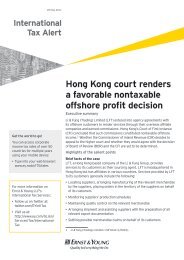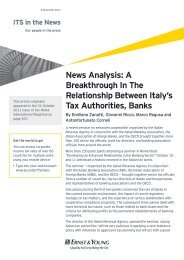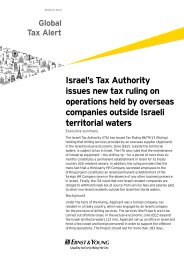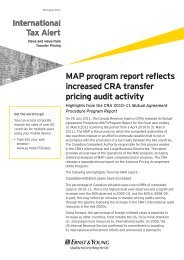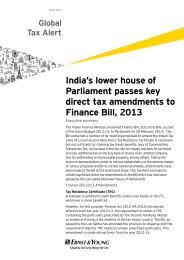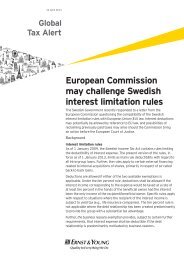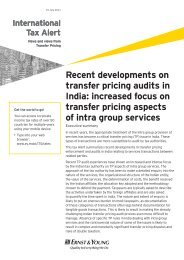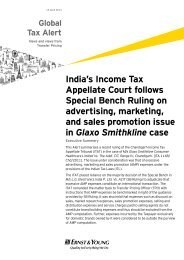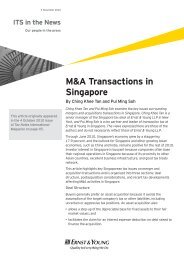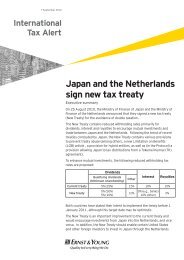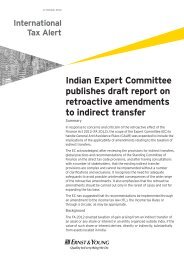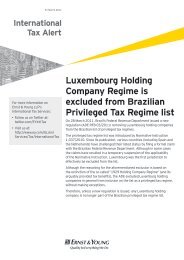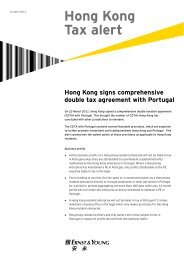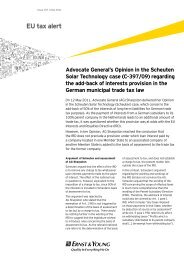Russian Court Overrides Authorities' Use Of Net-Back Approach In ...
Russian Court Overrides Authorities' Use Of Net-Back Approach In ...
Russian Court Overrides Authorities' Use Of Net-Back Approach In ...
Create successful ePaper yourself
Turn your PDF publications into a flip-book with our unique Google optimized e-Paper software.
This article originally<br />
appeared in the 13 June<br />
2011 issue of Tax Notes<br />
<strong>In</strong>ternational Magazine, on<br />
page 866.<br />
Get the world to go!<br />
6 July 2011<br />
ITS in the News<br />
Our people in the press<br />
You can access corporate<br />
income tax rates of over 50<br />
countries for multiple years<br />
using your mobile device:<br />
• Type into your web browser:<br />
www.ey.mobi/ITS/rates<br />
<strong>Russian</strong> <strong>Court</strong> <strong>Overrides</strong><br />
Authorities’ <strong>Use</strong> <strong>Of</strong><br />
<strong>Net</strong>-<strong>Back</strong> <strong>Approach</strong> <strong>In</strong><br />
Transfer Pricing Case<br />
By Henrik Hansen, Natalija Reuta and Ruslan Radzhabov<br />
The Federal Arbitration <strong>Court</strong> of the Moscow Region recently shot down<br />
<strong>Russian</strong> tax authorities’ attempt to adjust a taxpayer’s transfer pricing<br />
by applying the net-back approach (effectively an adjusted comparable<br />
uncontrolled price method).<br />
The Federal Arbitration <strong>Court</strong> of the Moscow Region recently shot down<br />
<strong>Russian</strong> tax authorities’ attempt to adjust a taxpayer’s transfer pricing<br />
by applying the net-back approach (effectively an adjusted comparable<br />
uncontrolled price method).<br />
The ruling 1 is notable because the court found that the net-back pricing<br />
method is not included in article 40 of the <strong>Russian</strong> Tax Code (the transfer<br />
pricing article) and is not in line with its provisions. The decision may<br />
therefore affect taxpayers with similar fact patterns, particularly those<br />
relating to certain types of commodities.<br />
<strong>Back</strong>ground<br />
The taxpayer, Gazprom Extraction Astrakhan LLC (GEA), made export<br />
sales of sulfur to Fedcominvest Monaco S.A.M, a trading company<br />
registered in Monaco. Fedcominvest resold the sulfur to customers in<br />
North Africa.<br />
GEA and Fedcominvest were co-founders of another company, <strong>In</strong>ter-S<br />
LLC, from which GEA rented sulfur granulation equipment. The tax<br />
authorities argued that the joint participation of GEA and Fedcominvest<br />
in <strong>In</strong>ter-S provided a basis for recognizing GEA and Fedcominvest as
elated parties. They concluded<br />
that GEA’s prices for the sulfur<br />
it sold to Fedcominvest in 2006<br />
were significantly lower than the<br />
market price, resulting in GEA’s<br />
underreporting of its taxable<br />
income for profits tax purposes.<br />
The Tax Authorities’ Arguments<br />
The tax authorities conducted<br />
a comparative analysis of sulfur<br />
prices in the North African market<br />
because the sulfur acquired by<br />
Fedcominvest from GEA was<br />
resold primarily to customers<br />
in North Africa. They obtained<br />
the pricing information from a<br />
report prepared by the Centre<br />
for Marketing Research and<br />
Expertise CJSC (CMRE) based on<br />
the customs and trade statistics of<br />
relevant North African countries<br />
as well as data from two industry<br />
magazines, <strong>In</strong>dustrial Minerals and<br />
Fertilizer Week. The tax authorities<br />
adjusted the sulfur prices identified<br />
in the North African market for<br />
transportation costs, insurance<br />
expenses (0.2 percent), export<br />
tariffs (6.5 percent), differences<br />
in financial terms (1 percent), and<br />
the minimum trading margin of<br />
Fedcominvest (5 percent).<br />
To support their approach, the tax<br />
authorities argued that the prices<br />
in GEA’s transactions with third<br />
parties could not be used as a<br />
benchmark because of significant<br />
differences in transaction volumes<br />
with Fedcominvest relative to those<br />
with third parties. Consequently,<br />
the tax authorities said, they<br />
had to seek comparable external<br />
prices. There are no comparable<br />
transactions in the <strong>Russian</strong> sulfur<br />
market, however, because GEA has<br />
a monopoly in Russia. 2<br />
The adjusted sulfur prices<br />
calculated by the tax authorities<br />
were significantly higher than<br />
the actual prices GEA charged to<br />
Fedcominvest. (It is not clear from<br />
the decision whether the deviation<br />
exceeded 20 percent.) Based on<br />
this finding, the tax authorities<br />
assessed additional tax and<br />
penalties on GEA.<br />
The <strong>Court</strong>’s Decision<br />
The court found that the tax<br />
authorities did not prove beyond<br />
doubt that GEA and Fedcominvest’s<br />
joint interest in <strong>In</strong>ter-S influenced<br />
the conditions of their transactions<br />
together. However, the court<br />
emphasized that the sulfur sales<br />
transactions between GEA and<br />
Fedcominvest were still subject<br />
to transfer pricing control on the<br />
grounds that they were foreign<br />
trade transactions. 3<br />
The court also challenged CMRE’s<br />
competence and expertise in<br />
determining market prices for the<br />
purpose of Tax Code article 40 and<br />
particularly for the application of<br />
the net-back approach. Holding<br />
that the net-back method is not<br />
in line with article 40, the court<br />
disregarded the arguments of the<br />
tax authorities on the following<br />
grounds:<br />
• The CMRE report and the two<br />
industry magazines do not<br />
qualify as “official sources of<br />
information” for purposes of<br />
article 40.<br />
2 ITS in the News Our people in the press<br />
• The North African market was<br />
not considered an appropriate<br />
reference market and the tax<br />
authorities should have tried to<br />
identify sulfur price benchmarks<br />
in Russia or neighboring markets<br />
such as Kazakhstan.<br />
• The tax authorities did not review<br />
competitors’ pricing policies.<br />
(Because GEA has a monopoly in<br />
the <strong>Russian</strong> market, it is unclear<br />
what competitors the court was<br />
referring to.)<br />
• The tax authorities overstepped<br />
article 40 by effectively using<br />
a combination of two transfer<br />
pricing methods in their analysis:<br />
the CUP method (by identifying<br />
the sulfur prices in the North<br />
African market) and the resale<br />
minus method (by determining<br />
the market price of sulfur by<br />
deducting GEA’s expenses and<br />
remuneration from the sulfur<br />
prices in the North African<br />
market).<br />
• The resale minus method was<br />
not applied as prescribed by<br />
article 40 because the basis was<br />
not Fedcominvest’s actual resale<br />
price. Moreover, when applying<br />
the resale minus method, the tax<br />
authorities had not proved beyond<br />
doubt the absence of comparable<br />
transactions with identical or<br />
similar sulfur or the absence of<br />
information to determine the<br />
market price.<br />
• The CMRE’s report did not<br />
provide any details about how the<br />
adjustments (insurance expense,<br />
Fedcominvest’s remuneration, and<br />
so on) were determined.
• <strong>In</strong> the court’s view, adjustments<br />
are allowed only for differences in<br />
contractual terms and conditions,<br />
and not for differences in<br />
markets. <strong>In</strong>terestingly, the court<br />
seems to have chosen to ignore<br />
its right “to take into account any<br />
circumstances that have a bearing<br />
upon the determination of results<br />
of a transaction, without being<br />
limited to those listed under Items<br />
4-11” of article 40 of the Tax<br />
Code.<br />
The <strong>Net</strong>-<strong>Back</strong> <strong>Approach</strong> and the<br />
Proposed Transfer Pricing Rules<br />
<strong>In</strong>terestingly, a proposed transfer<br />
pricing law published on the<br />
Finance Ministry’s website on May<br />
4 and proposed for enactment<br />
on January 1, 2012, states that<br />
prices can be adjusted to take into<br />
account differences in economic<br />
(commercial) conditions when<br />
applying the CUP method, but only<br />
when using exchange quotation<br />
data. The adjustments would take<br />
into account:<br />
• reasonable expenses to deliver<br />
goods (and works and services)<br />
to a particular market, supported<br />
by documentation or information<br />
sources;<br />
• expenses for the payment of<br />
export customs duties;<br />
• conditions of payment; and<br />
• commission (agency) fees payable<br />
to a broker (trader or agent) for<br />
the performance of intermediary<br />
trading functions.<br />
Moreover, the proposed transfer<br />
pricing law would require that<br />
adjustments be made to reflect the<br />
commercial and financial terms<br />
of controlled and uncontrolled<br />
transactions as well as market<br />
characteristics, if possible. <strong>In</strong><br />
principle, it should therefore be<br />
possible to make the adjustments<br />
attempted by the tax authorities<br />
in GEA when applying the CUP<br />
method, independent of the source<br />
of the data they used.<br />
Finally, the proposed transfer<br />
pricing rules state that a<br />
combination of two or more<br />
transfer pricing methods is possible,<br />
thereby removing the current<br />
hindrances to applying the net-back<br />
approach.<br />
Endnotes<br />
For additional information with respect to this ITS in the News, please contact the following:<br />
Moscow, Russia<br />
• Henrik Hansen +7 495 648 9608 henrik.hansen@ru.ey.com<br />
• Natalija Reuta +7 495 662 9322 natalija.reuta@ru.ey.com<br />
• Ruslan Radzhabov +7 495 755 9700 ruslan.radzhabov@ru.ey.com<br />
3 ITS in the News Our people in the press<br />
1. Case No. KA-A40/13304-10 of<br />
December 1, 2010.<br />
2. GEA is also the third-largest<br />
sulfur producer in the world.<br />
3. Note that under the proposed<br />
transfer pricing law, even<br />
in the absence of a formal<br />
interdependency between<br />
GEA and Fedcominvest, the<br />
transactions between them<br />
would still be subject to<br />
transfer pricing control because<br />
Fedcominvest is registered<br />
in Monaco, a blacklisted<br />
jurisdiction.
<strong>In</strong>ternational Tax Services<br />
• Global ITS, Jim Tobin, New York<br />
• Americas, Jeffrey Michalak, Detroit<br />
• Asia Pacific, Alice Chan, Hong Kong<br />
• Europe, Middle East, <strong>In</strong>dia and Africa, Alex Postma, London<br />
• Japan, Kai Hielscher, Tokyo<br />
• Latin America, Alberto Lopez, New York<br />
• Argentina Carlos Casanovas Buenos Aires<br />
• Australia Daryn Moore Sydney<br />
• Austria Roland Rief Vienna<br />
• Belgium Herwig Joosten Brussels<br />
• Brazil Gil Mendes Sao Paulo<br />
• Canada George Guedikian Toronto<br />
• Central America Rafael Sayagues San José<br />
• Chile Osiel Gonzalez Santiago<br />
• China Becky Lai Beijing<br />
• Colombia Ximena Zuluaga Bogota<br />
• Czech Republic Libor Frýzek Prague<br />
• Denmark Niels Josephsen Soborg<br />
• Finland Katri Nygård Helsinki<br />
• France Claire Acard Paris<br />
Régis Houriez Paris<br />
• Germany Stefan Koehler Frankfurt<br />
• Hong Kong Chris Finnerty Hong Kong<br />
• Hungary Botond Rencz Budapest<br />
Balazs Szolgyemy Budapest<br />
• <strong>In</strong>dia Vijay Iyer Bangalore<br />
• Ireland Kevin McLoughlin Dublin<br />
• Israel Sharon Shulman Tel Aviv<br />
• Italy Mario Ferrol Milan<br />
Gaetano Pizzitola Rome<br />
• Japan Kai Hielscher Tokyo<br />
• Korea Kyung-Tae Ko Seoul<br />
• Luxembourg Frank Muntendam Luxembourg<br />
• Malaysia Hock Khoon Lee Kuala Lumpur<br />
• Mexico Koen van ‘t Hek Mexico City<br />
• Middle East Tobias Lintvelt Abu Dhabi<br />
• Middle East Michelle Kotze Dubai<br />
• <strong>Net</strong>herlands Johan van den Bos Amsterdam<br />
• Norway Oyvind Hovland Oslo<br />
• Peru Roberto Cores Lima<br />
• Philippines Ma Fides Balili Makati City<br />
• Poland Andrzej Broda Warsaw<br />
• Portugal Antonio Neves Lisbon<br />
• Russia Vladimir Zheltonogov Moscow<br />
• Singapore Andy Baik Singapore<br />
• South Africa Corlie Hazell Johannesburg<br />
• Spain Federico Linares Madrid<br />
• Sweden Erik Hultman Stockholm<br />
• Switzerland Markus F. Huber Zurich<br />
• Taiwan Jennifer Williams Taipei<br />
• Thailand Anthony Loh Bangkok<br />
• Turkey Feridun Gungor Istanbul<br />
• United Kingdom Matthew Mealey London<br />
Jim Charlton London<br />
• United States Jeffrey Michalak Detroit<br />
• Venezuela Jose Velazquez Caracas<br />
• Vietnam Vu Huong Hanoi<br />
4 ITS in the News Our people in the press<br />
Ernst & Young<br />
Assurance | Tax | Transactions | Advisory<br />
About Ernst & Young<br />
Ernst & Young is a global leader in<br />
assurance, tax, transaction and advisory<br />
services. Worldwide, our 141,000 people<br />
are united by our shared values and an<br />
unwavering commitment to quality. We<br />
make a difference by helping our people,<br />
our clients and our wider communities<br />
achieve their potential.<br />
Ernst & Young refers to the global<br />
organization of member firms of<br />
Ernst & Young Global Limited, each of<br />
which is a separate legal entity.<br />
Ernst & Young Global Limited, a UK<br />
company limited by guarantee, does<br />
not provide services to clients. For more<br />
information about our organization, please<br />
visit www.ey.com.<br />
<strong>In</strong>ternational Tax Services<br />
About Ernst & Young’s <strong>In</strong>ternational Tax<br />
Services practice<br />
Our dedicated international tax<br />
professionals assist our clients with their<br />
cross-border tax structuring, planning,<br />
reporting and risk management. We<br />
work with you to build proactive and<br />
truly integrated global tax strategies that<br />
address the tax risks of today’s businesses<br />
and achieve sustainable growth. It’s how<br />
Ernst & Young makes a difference.<br />
www.ey.com<br />
© 2011 EYGM Limited.<br />
All Rights Reserved.<br />
EYG no. CM2433<br />
This publication contains information in summary form<br />
and is therefore intended for general guidance only. It<br />
is not intended to be a substitute for detailed research<br />
or the exercise of professional judgment. Neither EYGM<br />
Limited nor any other member of the global Ernst &<br />
Young organization can accept any responsibility for<br />
loss occasioned to any person acting or refraining from<br />
action as a result of any material in this publication. On<br />
any specific matter, reference should be made to the<br />
appropriate advisor.



